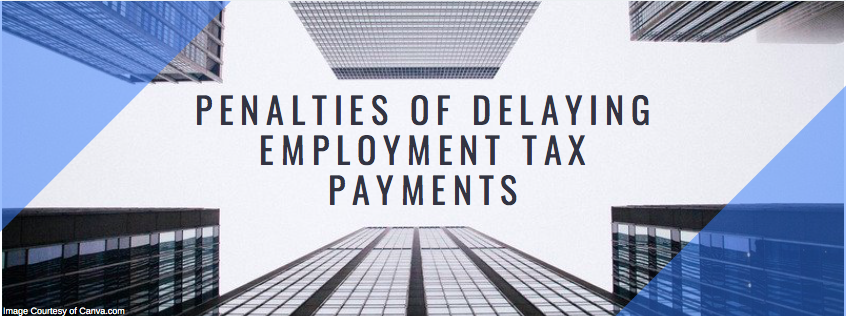Nobody likes paying their taxes – perhaps none less so than employment taxes.
Simply put, employment taxes are paid generally with every payroll or monthly (periodically a business may pay quarterly) when an amount is withheld from employee paychecks and sent to the IRS and state agencies.
Though a rather straightforward procedure, like most taxes, employment taxes are expected to be paid on-time according to the schedule in which they fall.
And while it may be tempting to hang onto some of that withheld money for a little bit, using it for business expenses in the moment before paying the amount later to the tax agencies, that would be a big mistake.
Unlike most taxes, employment taxes are considered trust monies (don’t belong to the business) and come with large penalties if paid late – and they don’t just affect one person either.
Under Section 6672(a), whenever a breach in employment taxes conduct is detected, the IRS can perform a Trust Fund Recovery Assessment towards not just the business owner, but all “responsible parties”; meaning that even if you were unaware of the tax violation, if you’re a company owner, signer, or hold authority over business decisions and payables, you could be held liable.
And if you’re considered liable, the IRS can pursue you for repayment of the penalties if the company refuses to, or is unable to come up with the money. If the IRS has issued a Trust Fund Penalty, the amount of penalty is a whopping 100% of the tax due.
As a result of multiple shareholders receiving the same IRS notice, responsibility for the payment is often passed around from owner to owner until one is caught with legal or factual blame, leaving them stuck to foot the bill while the others skate free.
If the business refuses to pay within a prompt timeframe, the IRS can forcefully collect through levying the company bank account, but only after an official notice has been sent or the business has been offered a Collection Due Process Hearing.
A right only available in certain situations, a Collection Due Process Hearing can sometimes grant businesses taxes-due installation plans, an offer in compromise, or other repayment options, but is only eligible for employers who don’t qualify as “predecessors”.
What does the IRS consider a predecessor business?
When determining whether a company should be offered a Collection Due Process Hearing, the tax agency often looks at whether:
• The owners and employees, or those making business decisions – whether they’re officially known as owners/shareholders or not – are roughly the same;
• There’s proof showing any change of ownership was done through an arms-length transaction at fair market value;
• The products, services, customers, or assets maintained are similar to that under previous ownership; and
• The location, phone number, fax, or other identifiers are the same as the old business (IRC Section 63330(h)).
If, after evaluating all these points, a business is deemed to be predecessor, a Collection Due Process Hearing cannot be granted and all taxes and penalties are due as is – the IRS maintaining the right to collect via a direct bank account levy.
Bottom line: there’s no good excuse for delaying paying your employment taxes, or using the money for another purpose. With a 100% penalty and very little leniency, the IRS takes payroll taxes arguably more seriously than any other tax, and will come to collect by any means necessary.
Don’t risk it – pay your taxes in full and on-time, or invest in payroll software that will set aside employment taxes automatically.
(This post was based off this article by Robert W. Wood.)
